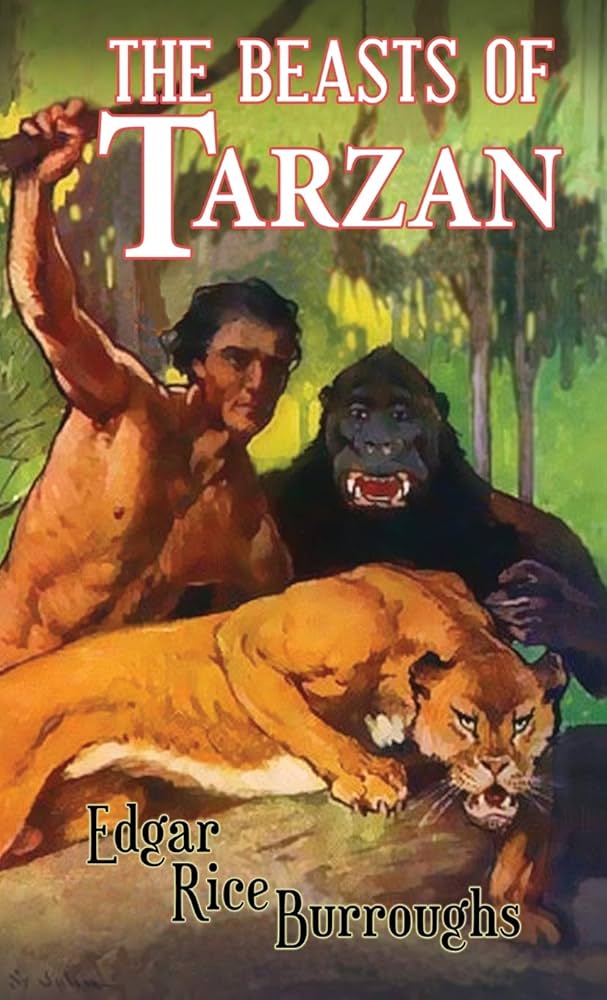Chapter 9 — The beasts of Tarzan
byChapter 9 – The Beasts of Tarzan unfolds with Jane Clayton held prisoner aboard the Kincaid, surrounded by dangers both visible and insidious. Isolated and without any knowledge of Tarzan’s fate, she endures the manipulative advances of the treacherous Nikolai Rokoff. His condescending claims that Tarzan is a brute and that she would be safer in his care are quickly dismissed by Jane, whose loyalty to her husband is firm. Her refusal enrages Rokoff, exposing the depth of his cruelty as he threatens her child’s life to force submission. This moment defines Jane’s unyielding moral compass, showing that her love is built not on circumstance but on deep, unwavering respect. In the midst of this storm, a most unlikely figure steps into a quiet role of heroism.
Sven Anderssen, the ship’s cook, emerges from obscurity with a resolve that surprises even himself. Rokoff’s abuse and manipulation have not gone unnoticed by Sven, whose broken English and quirky behavior had masked a mind both observant and brave. Jane’s previous acts of kindness toward him contrast sharply with Rokoff’s insults and violence, leading Sven to silently take her side. He begins to observe the villain’s routines and devise a plan. While speaking in seemingly disconnected phrases, he hides his true intentions behind a screen of foolishness. Underneath that mask lies a quiet determination to resist injustice in his own way. With every whisper he overhears and every scolding he receives from Rokoff, Sven’s decision becomes clearer.
Late one moonless night, Sven springs into action, wrapping his mission in secrecy and subtlety. Jane, though wary, senses the urgency and joins him, placing her faith in the odd but earnest man. With the baby nestled close, they descend into the shadows, slipping into a hidden boat prepared in advance. Their escape is marked by tension and silence, the splashing of oars blending with the distant howls of nocturnal predators. Sven rows with the strength of desperation, steering them away from danger and into the uncertainty of the jungle river. Though they are free of the Kincaid, their new reality offers no guarantees of safety. The jungle is indifferent to innocence or courage, and Jane knows this all too well.
Navigating through the darkness, they are surrounded by strange birdcalls and the distant growls of wild animals. The Ugambi River stretches endlessly ahead, winding through a land that remains hostile to outsiders. As they drift further, Jane clings to her child, drawing strength from the warmth of his breath and the calm determination of her quiet protector. Sven, though visibly nervous, never falters. His earlier foolishness is gone, replaced by a stoic sense of purpose. After hours of tense travel, they arrive at a village hidden in the jungle’s folds—a place Sven had quietly prepared for them. Jane steps onto land, unsure of what awaits, but relieved to feel solid ground beneath her feet again.
The villagers, curious and cautious, gather as the trio arrives, but they offer no immediate threat. Their language is foreign to Jane, but the gestures are kind, and their eyes speak of hospitality. A small hut is offered, and within its walls, Jane finds the first moment of peace in days. Here, survival is raw and simple, without luxuries, but it grants her time to breathe and think. The baby, miraculously unharmed, sleeps soundly as Jane reflects on the journey. Gratitude fills her heart for Sven’s bravery, whose quiet act of defiance saved her from a fate too terrible to name. The villagers’ quiet acceptance gives her hope.
This chapter illuminates the strength of the human spirit in the face of oppression and fear. Jane’s resistance, rooted in dignity and love, is matched by Sven’s courage, born of humility and quiet suffering. Both find an unexpected bond in their shared defiance of Rokoff’s cruelty. The narrative reminds readers that true strength doesn’t always roar; sometimes, it is found in gentle actions, whispered warnings, or a quiet row down a dangerous river. It is also a testament to the idea that heroism can live in those least expected to carry its weight. Jane and Sven, brought together by circumstance, now share a journey forged not in ease, but in endurance.
For readers, this tale serves as a reminder of resilience and the power of kindness in bleak situations. While Tarzan battles in the jungle, his wife fights in her own way—with willpower, intelligence, and trust. The contrast between Rokoff’s manipulation and Sven’s loyalty paints a compelling picture of moral choices under pressure. Through subtle shifts in character behavior and the tension of escape, the chapter keeps readers engaged without needing grand battles or sweeping action. The power of human decency, even in the harshest places, becomes the real heart of this chapter. And in that heart, readers find the emotional depth that gives this wild tale its soul.

